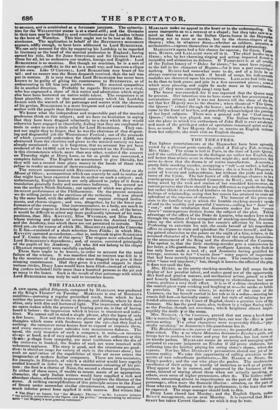THE ITALIAN OPERA.
A NEW opera, called Ildegonda, composed by MARLIANT, was produced at the King's Theatre* on Tuesday. MARLIANI is one of Rossini's satellites—pursuing a regular prescribed track, from which he has neither the power nor the desire to deviate, and shining, where he does shine, only with dim and borrowed light. The impression which such an opera makes while the process of hearing goes on, is that of having beard it before : the impression which it leaves is transient and indis- tinct. We cannot call to mind a single phrase, after the lapse of only a few hours. Now and then there are gleams of pleasing melody, and thoughts which come with freshness upon the ear—but they lead to nothing: the composer never knows how to expand or improve them, and every successive piece subsides into monotonous dulness. The usual, the only resource of such a composer, is noise.—a resource always at band, ar.d of easy application ; and as the audiences at this theatre. p'rbaps from sympathy, are most vociferous when the din of the orchestra is loudest, the finales of each act were received with vehement applause. The story is good, and the situations are good : therm is abundant scope for variety of style in the choruses alone ; but such an application of the capabilities of their art never enters the imagination of modern Italian composers. There are two occasions, for example, in lldegonda, of which a skilful artist would have eagerly availed himself in order to vary the monotonous colouring of his pic- ture : the first is a chorus of Nuns, the second a chorus of Inquisitors. In either of these cases, if unable to invent music of an appropriate character, the early Italian writers would have supplied a rich and abundant choice, wherewith to preserve and heighten the illusion of the scene. A striking exemplification of this principle occurs in the Faust of SPOHR under somewhat similar circumstances, and composers of much inferior power have applied it with success. But writers like • The litag's no longer, but "her Majerty's Theatre :" so Mr. LAPORTE informs • the nubility, subscribers to the Opera, and the public." communicating by advertise. meat " Ler Majest)'s most gracious conimautl." MARI.IANI make no appeal to the heart or to the understanding. 'j scene transports us to a convent or a chapel ; but they take care to re. mind us that we are at the Italian Opera-house in the Haymarket listening not to nuns or monks, but to the chorus-singers of the theatre ; who, in whatever dress—whether as soldiers, peasants, of ecclesiastics—express themselves in the same musical phraseology, Meauesn's opera bad a fair chance for success; for Gnisi, Taman. RINI, RUBINI, and LABLACHE were all in it. The chief burden lay or, Geist ; who, by her charming singing and acting, imparted flavour is insipidity and animation to dulness. If TAMBURINI is at all sensible of the Italian luxury of " Doke far niente," he must have enjoyed it to the full in his character of Rogiero—for it was a part consisting et nothing. RUBINI had somewhat more to do, and of a little he eta always contrive to make much : if bereft of songs, his indispensable roulades are showered upon his recitatives. LABLACHE hod little mote to do than to look grave, and join in a few concerted pieces ; some of which were pleasing, and might be made more so by curtailment. some (if they were correctly sung) very bad.
The house was crowded, for it was reported that the Queen would be present. Her intention was to have come with her accustomed us. ostentatious privacy, and it was not known till the close of the fiat act that her Majesty was in the theatre ; when shouts of " The Queen, the Queen ! " echoed through the house ; and, after it few minutes, Ile came to the front of her box, and gracefully acknowledged the greeting' of her loyal subjects. There was a general call for " God save the Queen ;" which was played. not sung. The Italian Opera-house is not the place in which the enthusiasm of John Bull is ever awakened; and most of the privileged order of spectators remained quiet and life less, as usual. It' her Majesty desire to receive an English welcome from her subjects, she must visit an English theatre.


























 Previous page
Previous page